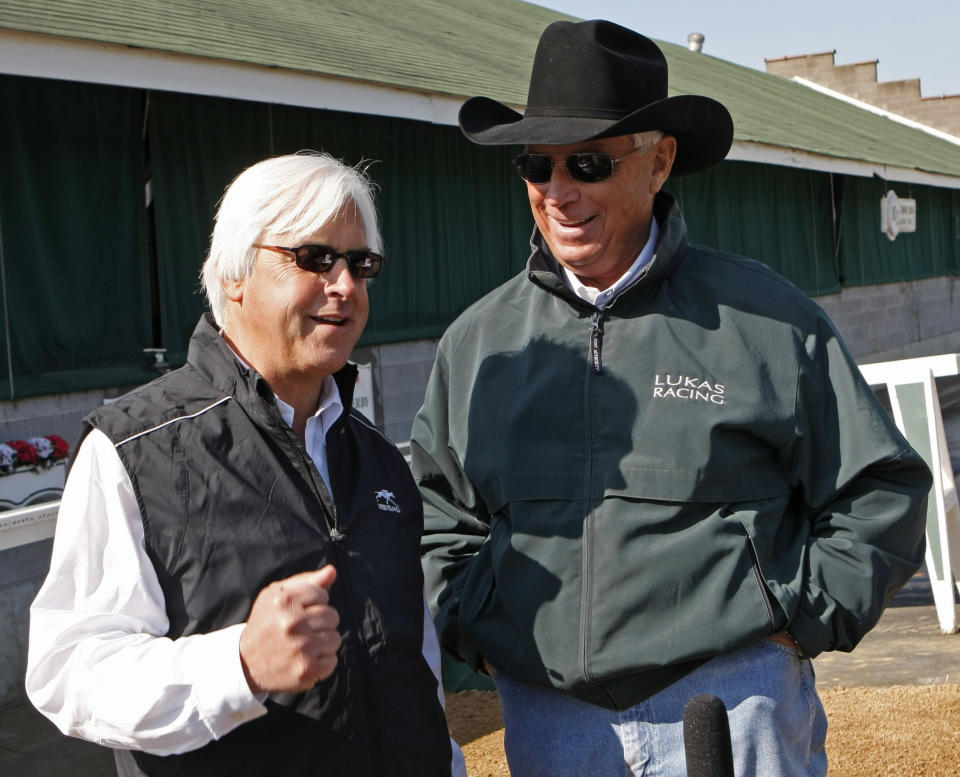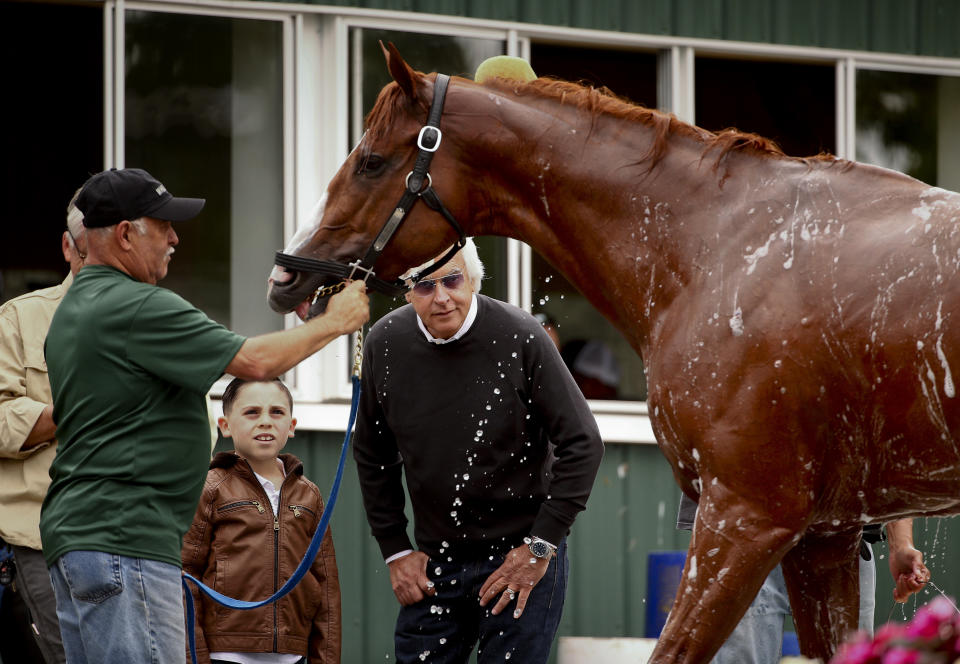Belmont Stakes: There's more to it than just Justify vs. the field
ELMONT, N.Y. — There was a time when D. Wayne Lukas and Bob Baffert did not like each other. Hatred might even have been the more accurate term.
In the mid-to-late 1990s, when Baffert was ascending to the top of the thoroughbred racing trainer hierarchy and Lukas was starting to lose his grip on the throne, the enmity was real and scarcely concealed. Lukas took shots at Baffert for keeping something closer to banker’s hours than trainer’s hours, showing up at the barn well after daylight and flouting the 4 a.m. mythology of the job. Baffert had some digs at Lukas’ arrogance, more privately than publicly, suggesting that his rival had ingested a lethal dose of his own hype.
In a sport where there’s only so much publicity to go around, two men who enjoy the spotlight fought ferociously for it.
Today they take turns spouting compliments about each other, after an icy rivalry thawed into a river of mutual respect. Baffert asked Lukas to introduce him at his Hall of Fame induction in 2009, and Lukas asked Baffert to contribute to his forthcoming book. They’re too old for enemies now, too established and too comfortable in their respective skins, Lukas at 82 and Baffert at 65.

Taking their cue from the trainers themselves, most racing fans have long since stopped taking sides in a once-fierce rivalry and developed an appreciation of both men. And they should. Because Wayne Lukas and Bob Baffert are the greatest things to hit the Triple Crown since Affirmed raced Alydar.
They are tied for the most Triple Crown wins in history, both with 14, and both gunning for a 15th victory Saturday in the Belmont Stakes. Baffert has the towering favorite, Justify, winner of both the Kentucky Derby and the Preakness and undefeated in five lifetime starts. But don’t count out old warhorse Lukas and his young horse Bravazo, which finished a fast-closing second to Justify in the Preakness.
Yet more important than just winning the big races is the fact that both men have consistently tried to win the big races. They live for the Triple Crown, and the Triple Crown lives in no small part because of them.
The only horses to compete in the Derby, Preakness and Belmont this year are Justify and Bravazo. That’s not an anomaly; it’s how Baffert and Lukas do business. They are the last of the old-school campaigners who never want to skip a big race – especially these three high-stakes competitions.
“This is what we live for, to be in these big races,” Baffert said.
“I think a lot of the trainers haven’t really embraced it the way we have, maybe,” Lukas said. “It’s such a career-making thing.”
Their careers are unmatched in modern times.
Until 2017, Lukas had run the most horses in Kentucky Derby history. He’s since been bypassed by Todd Pletcher – who has sent a ton of horses to Louisville while only winning twice — but Lukas’ 49 entries rank second. Baffert, who didn’t have a Derby starter until 15 years after Lukas’ first, is third on the list with 29. (Baffert has won more roses, however, with five Derby victories to Lukas’ four. Only “Plain Ben” Jones has won more than either man, with six.)
Lukas’ 43 Preakness starters are the most of any trainer. Baffert has entered 19 horses in the Crown’s second leg. Between the two of them they have won 13 times – Baffert a record-tying seven and Lukas six.
Lukas will saddle his 25th Belmont starter Saturday, Baffert his 11th and 12th (Restoring Hope is entered as well). Lukas has won four installments of the third jewel in the Crown, including three in a row from 1994-96. Baffert has won two, most famously in 2015 when American Pharoah did what Justify will try to do Saturday by sweeping the series.
The two have a startling amount in common, which might actually explain some of the early animosity – they were too much alike.
Both started out in the quarter-horse game, and Baffert remembers as a teenager being awestruck when Lukas brought some of his horses to the track in his hometown of Nogales, Arizona. That’s a rough-and-tumble side of the sport, without a lot of prize money to spread around. Everyone raced to win, not just to hit the board and pick up a check.
“We both have a little of the quarter-horse mentality,” Lukas said. “You’ve got to be in the top 2 percent [to make a lot of money]. If you’re outside the top 2 percent on down, nobody knows you’re alive.”
Another part of the quarter-horse mentality that translates directly to the Triple Crown campaign: quick turnarounds for horses. In those short races, horses have to advance from preliminaries to finals – there isn’t a lot of rest and pampering at the quarter-horse level. To make the Kentucky Derby, most horses must be pushed hard in their 3-year-old campaign – which is why a lot of them fall by the wayside along the way.
Baffert had 31 3-year-olds nominated for Triple Crown races in January. He took two to Louisville. Some didn’t develop, some were injured, some the trainer backed off on because he knew they wouldn’t be ready in time. When Justify emerged late in the going, he quickly became the star of Baffert’s barn.

This is one more area where Baffert copied the Lukas plan: not just the transition from the quarter horses to thoroughbreds; not just setting up operations in Southern California but campaigning nationwide; but also the original strength-in-numbers approach to 3-year-old racing. One of the best ways to ensure working for deep-pockets owners – and, thus, having high-quality horses – is by selling them on the Derby/Triple Crown dream.
“I just followed him,” Baffert said of Lukas. “He opened the door.”
Fact is, Baffert went through the door at full speed and has never stopped. Talk about a quick learner – his first Derby horse, Cavonnier, lost a photo finish to Lukas’ Grindstone in 1996. His second Derby horse, Silver Charm, won the ’97 Derby and the Preakness. Then Baffert won both again in ’98 with Real Quiet, coming within a nose of taking the Triple Crown.
But just as Baffert was taking over the sport, Lukas fought back. In 1999 he got Charismatic into the Derby field at the 11th hour, winning the last-chance Lexington Stakes. Then Charismatic shocked everyone by winning the Derby and the Preakness before losing and getting injured near the wire in the Belmont.
In a decision that quite likely reflected the depth of the rivalry at that stage, Baffert ran his celebrated filly, Silverbulletday, in the Belmont. It was just the 21st time a filly had run in the 1 ½-mile race, and it was widely seen as Baffert pulling out all the stops to derail the Triple Crown sweep that had eluded him the previous two years. Silverbulletday finished a well-beaten seventh.
The next year, Lukas scored an upset win in the Belmont with Commendable – but that was one of the last of his big-time scores. He eventually moved his downsized operation to Kentucky and Arkansas, splitting time between homes there. (His new Kentucky home is a log cabin in the woods about 30 miles outside Louisville, one of the few ways in which Lukas shuns attention.)
Lukas didn’t win another Triple Crown race until a shocker in the 2013 Preakness with Oxbow, who got away with an easy lead early and hung on. Meantime, Baffert’s profile kept rising until it eclipsed that of the man he patterned himself after, and then bitterly competed against.
When it was no longer an annual battle for Southern California supremacy and Triple Crown prowess, the antipathy between the two men vanished. In its place, a friendship sprouted. Today, they do their best to downplay the old grudges, to the point of occasionally (and disingenuously) denying they ever existed.
Lukas lauds Baffert’s horsemanship – both his ability to identify a promising young animal, and then his ability to develop it into a runner.
“If Bob told me [to go look at a horse], I wouldn’t have to go look,” Lukas said. “I’d just say, ‘Go mark that one down in the catalog because he’s a hell of a nice horse.’ ”
Lukas never would have lauded Baffert for that two decades ago. Nor would Baffert laud the eternal competitiveness of Lukas.
“There’s not a white flag in his barn,” Baffert said. “He’s never owned a white flag and he never will.”
Lukas is so stubbornly spry that he insists on going from his barn to the track each morning on horseback, at age 82, to watch his runners work out. Asked if there will ever come a day when he walks to the track and doesn’t climb on a horse, Lukas answered, “Yes, there will. And the next day there will be a eulogy.”
D. Wayne Lukas would love nothing more than to write Justify’s Triple Crown eulogy Saturday, upsetting him with Bravazo. Bob Baffert would love nothing more than to beat Lukas and the rest of his Belmont rivals, breaking the tie in all-time Triple Crown wins. But at least now they can admit they took turns making each other better, and have made their sport better along the way.
More from Yahoo Sports:
• Charles Robinson: Kap’s legal team looks to turn tables on Trump
• This might be the craziest blooper in MLB history
• Dan Wetzel: Cavs have totally wasted the LeBron era
• Chris Mannix: Are the Warriors taking the fun out of the NBA?

